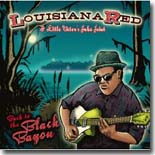 Louisiana Red has
to be one of the most prolific recording artists
since John Lee Hooker. He’s recorded for Atlantic,
Roulette, Tomato, L + R, JSP, Earwig, Severn,
Hightone, Red Lightnin’ and over a dozen other
labels since the early 1960s. This time around, he’s
on Bluestown (via Ruf Records) with a great album
recorded in Norway at Juke Joint Studios in Norway,
called Back To The Black Bayou.
Louisiana Red has
to be one of the most prolific recording artists
since John Lee Hooker. He’s recorded for Atlantic,
Roulette, Tomato, L + R, JSP, Earwig, Severn,
Hightone, Red Lightnin’ and over a dozen other
labels since the early 1960s. This time around, he’s
on Bluestown (via Ruf Records) with a great album
recorded in Norway at Juke Joint Studios in Norway,
called Back To The Black Bayou.
I’m not sure what the
bayou situation is in Norway, but this disc is
loaded with tons of swampy atmosphere, just like
those records that used to come from the Gulf Coast
in the late ’50s/early ’60s. This is due in part to
the production values of Little Victor, who also
plays guitar and harmonica on the album, the vintage
recording equipment (part of which was once housed
in the legendary Stax Studios in Memphis), guest
artists like harmonica wizards Kim Wilson and Bob
Corritore and piano man Dave Maxwell, and, last but
not least, Louisiana Red himself.
Back To The Black
Bayou has a dozen tracks, several of which are
modern recordings of some of Louisiana Red’s most
popular songs. “I’m Louisiana Red,” “Alabama Train,”
“Ride On Red, Ride On,” “Too Poor To Die,” and “I
Come From Louisiana” still have the same power and
feeling of the original versions, even though there
are a few tempo changes. The new versions of “I’m
Louisiana Red” and “Alabama Train” are particularly
cool and feature great guitar interplay between Red
and Victor. “Ride On Red” and “Too Poor To Die”
deserve a place in the Blues Hall of Fame for their
great lyrics (in the case of the latter, more timely
now than ever before).
On the originals, Red
gives his best vocal performance and some terrific
slide guitar on the Elmore James tribute, “Crime In
Motion,” and “Sweet Leg Girl” sounds like a early
’50s Robert Nighthawk Chicago Blues track (save for
Red’s distinctive vocal turn). “The Black Bayou” is
reminiscent of those old Excello classics and “You
Done Quit Me” grooves relentlessly. “Don’t Miss That
Train” is a fine gospel tune, and “Roamin’ Stranger”
has a vintage Chess Records feel. “At The Zanzibar”
is an instrumental tribute to Muddy Waters and
Little Walter (with Kim Wilson tearing it up on
harp).
Though I haven’t heard
everything Louisiana Red has released, I’ve heard
quite a bit and so far, I haven’t heard anything
that wasn’t first-rate. Back To The Black Bayou
is a must-have for Red’s devoted fans and should be
required listening for newcomers.
--- Graham Clarke
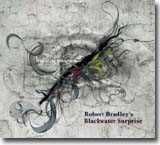 Out of the Wilderness
(Quarter 2 Three Records) is the first studio album
in five years from Robert Bradley’s Blackwater
Surprise. Bradley, the blind former Detroit
street singer, has amazed listeners for the past
dozen or so years, with his intense,
gospel-influenced vocals and his unique lyrical
vision. Combining his gifts with a more alternative
sound from his band forms a distinct fusion of soul,
blues, and rock. For this latest release, Bradley’s
soul roots take center stage.
Out of the Wilderness
(Quarter 2 Three Records) is the first studio album
in five years from Robert Bradley’s Blackwater
Surprise. Bradley, the blind former Detroit
street singer, has amazed listeners for the past
dozen or so years, with his intense,
gospel-influenced vocals and his unique lyrical
vision. Combining his gifts with a more alternative
sound from his band forms a distinct fusion of soul,
blues, and rock. For this latest release, Bradley’s
soul roots take center stage.
Bradley’s songs usually
deal with loss or yearning or hopes for better days,
and there are plenty of representative songs on
Out of the Wilderness. “Beautiful Girl” deals
with his daughter leaving home for the first time.
“Alabama” is a longing tribute to Bradley’s home
state (one which earned him a Certificate of
Commendation from Alabama Governor Bob Riley), and
“Americaland” is a song about trying to get by on a
daily basis. “Cryin’ My Eyes Out,” and “Gotta Find A
Woman” are two other standout tracks of this type.
Not all the songs are
downbeat though. “Love You in the Daytime” and
“Everybody Wanna Party” are both cheerier fare, and
the title track finds Bradley optimistic that things
will be better. Three songs on the disc (“Love You
in the Daytime, “Cryin’ My Eyes Out,” and “Everybody
Wanna Party”) will be featured in an upcoming motion
picture, Love N’ Dancing.
Bradley’s backing
musicians have changed completely since the band got
their start recording in 1996. Featured are
guitarists Matthew J. Ruffino and Zachary Throne,
bass player Larry “Bones” Dennison, and drummer
Oscar Seaton along with percussionists Craig Krampf
and Scot Bihlman. Producer Bruce Robb also plays
keyboards. The disc was recorded at Cherokee Studios
in Hollywood, which gives the disc more of a vintage
R&B sound.
If you’re a fan of
classic soul and R&B and are unfamiliar with the
talented Robert Bradley, Out of the Wilderness
is a great place to start. With his great vocals
that recall Ray Charles and his incredible
songwriting that rivals anyone currently active in
blues or R&B, he deserves to reach a wider audience.
--- Graham Clarke
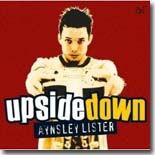 Upside Down (Ruf
Records) is Aynsley Lister’s first release
since his collaboration with Ian Parker and Erja
Lyytinen, Pilgrimage: Mississippi to Memphis.
It’s his fourth studio release and the first to
contain all original compositions. Lister grew up
listening to his father’s record collection,
comprised of mostly blues and soul music and learned
to play guitar from listening to 45s (remember
those) of Freddie King, Eric Clapton, and John
Mayall, and was leading his first band in his late
teens. His music can best be described as
blues/rock-driven guitar, soul-influenced vocals,
and amazingly catchy lyrics and hooks that would be
a good fit on any rock or pop radio station. In
other words, something to appeal to most discerning
music fans today.
Upside Down (Ruf
Records) is Aynsley Lister’s first release
since his collaboration with Ian Parker and Erja
Lyytinen, Pilgrimage: Mississippi to Memphis.
It’s his fourth studio release and the first to
contain all original compositions. Lister grew up
listening to his father’s record collection,
comprised of mostly blues and soul music and learned
to play guitar from listening to 45s (remember
those) of Freddie King, Eric Clapton, and John
Mayall, and was leading his first band in his late
teens. His music can best be described as
blues/rock-driven guitar, soul-influenced vocals,
and amazingly catchy lyrics and hooks that would be
a good fit on any rock or pop radio station. In
other words, something to appeal to most discerning
music fans today.
From the opening cut,
the churning rocker, “Find My Way Home,” Upside
Down is loaded with memorable tracks. Lister
smolders on guitar with one distinctive solo after
another. “Getaway” is somewhat more sedate, but not
by much. “Ice I’m Upon” is another standout,
possibly a hit single in a perfect world, with its
pop sensibilities and a killer vocal by Lister.
“Beautiful” is just
that, a sweet tribute to Lister’s daughter. “With Me
Tonight” is a tough Texas shuffle and one of the
more straight blues tracks present. The slide-driven
“In The Morning” is a powerful tune with deep roots
in southern rock, and kicks off a remarkably intense
set of songs that concludes the disc, including the
wild and wooly title track, “Disorderly Me,” a
roof-rattler of its own, and the breathless closer,
“Falling Down.”
Amazingly, this is all
done by a three-piece band, with Lister’s
magnificent guitar, Jo Nichols on bass, and Alex
Thomas on drums (with backing vocals by Sue Quin).
This is without a doubt
Aynsley Lister’s best release to date. How he hasn’t
become a bigger deal here in the U.S. is a mystery.
Hopefully, Upside Down will be the disc that
puts him over the top. It’s definitely one of the
best blues-rock efforts so far this year with
memorable tunes, great performances, and some
monster guitar. By all means, don’t let this one
pass you by.
--- Graham Clarke
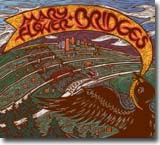 Mary Flower was a
nominee for “Acoustic Artist of the Year” at the
2008 Blues Music Awards, which was appropriate.
Flower is recognized as one of the foremost acoustic
guitarists performing today. Her rich and unique
blend of roots music blends the blues with ragtime
and folk. Influenced on guitar by artists like
Scrapper Blackwell, Blind Blake, and the Reverend
Gary Davis, Flower also possesses a husky vocal
style that goes down smooth.
Mary Flower was a
nominee for “Acoustic Artist of the Year” at the
2008 Blues Music Awards, which was appropriate.
Flower is recognized as one of the foremost acoustic
guitarists performing today. Her rich and unique
blend of roots music blends the blues with ragtime
and folk. Influenced on guitar by artists like
Scrapper Blackwell, Blind Blake, and the Reverend
Gary Davis, Flower also possesses a husky vocal
style that goes down smooth.
Flower’s latest release,
Bridges (Yellow Dog Records), is a modern
take on some classic songs from, or reminiscent of
music from the early 20th century. She has unearthed
some rather obscure tunes from this era, including
“There Ain’t No Sweet Man That’s Worth The Salt of
My Tears,” a Bix Beiderbecke piece made popular by
Bing Crosby in the ’30s, Big Bill Broonzy’s “Big
Bill Blues,” “The Ghost of the St. Louis Blues,”
from ’20s minstrel singer Emmett Miller, and the
popular standard, “Up A Lazy River.” There are a
couple of gospel tunes as well, E.C. Ball’s “When I
Get Home I’m Gonna Be Satisfied,” and a medley of
“On Revival Day/There’s Going To Be The Devil To
Pay.”
Flower’s own
compositions include “Portland Town,” a tribute to
her place of residence, the gentle opening track,
“Rhythm of the Road,” and four lovely instrumentals
(“Columbia River Rag,” “Slow Lane To Glory,”
featuring her on lap steel, “Daughter of
Contortion,” and “Blue Waltz”).
Living up the album
title, Flower recruited local Portland musicians
across multiple genres to participate, from the
blues to jazz to bluegrass and old-time music, to
swing, to pop to world music. Bridges effortlessly
combines these diverse styles into one cohesive
unit. It’s a breathtaking tribute to early 20th
century music styles as well as to the diversity of
the Northwestern U.S. music scene that should please
acoustic guitar fans of all genres.
--- Graham Clarke
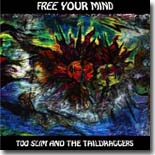 Free Your Mind
(Underworld Records) is the 10th studio release from
Too Slim and the Taildraggers. Front man Tim
Langford (AKA “Too Slim”) has been doing this for a
couple of decades now, building a devoted fan base,
branching out from their home area in Seattle and
having shared the stage over the years with the
likes of Bo Diddley, Brian Setzer, Otis Rush, Robert
Cray, Johnny Lang, Los Lobos, Lonnie Mack, Travis
Tritt, Ted Nugent, Delbert McClinton, and a score of
other big names. The band has won multiple awards in
various Northwest readers’ polls, and has been
recognized as best regional act by the Cascade Blues
Association 11 times.
Free Your Mind
(Underworld Records) is the 10th studio release from
Too Slim and the Taildraggers. Front man Tim
Langford (AKA “Too Slim”) has been doing this for a
couple of decades now, building a devoted fan base,
branching out from their home area in Seattle and
having shared the stage over the years with the
likes of Bo Diddley, Brian Setzer, Otis Rush, Robert
Cray, Johnny Lang, Los Lobos, Lonnie Mack, Travis
Tritt, Ted Nugent, Delbert McClinton, and a score of
other big names. The band has won multiple awards in
various Northwest readers’ polls, and has been
recognized as best regional act by the Cascade Blues
Association 11 times.
Langford wrote all of
the tunes on Free Your Mind. “When You Love
Somebody” is a love song with Skynyrd overtones, and
“Last Train” was written after Langford read the
newspaper one morning, with lines taken from actual
headlines that day. “Devil In A Doublewide” would
have been a southern rock classic back in the day.
The title cut has great slide guitar and lyrics and
some solid advice. “Testament” is a dark song with
Langford begging for strength and endurance, and
“Been Thru Hell” is about having the resolve to make
it through the tough times.
The moody “Peace With
The Maker” covers a deal with the devil and its
repercussions. If more of us took the advice offered
in “Bottle It Up” (keeping our traps shut), we’d be
the better for it (more great slide work from
Langford). “Throw Me A Rope” is a modern take on the
“Nobody Knows You When You’re Down and Out” theme,
and “This Phone” is a humorous song about being
“lovesick and lonesome” and sitting by the phone
waiting for it to ring (Yeah, we’ve all done it).
The closing track, “The Light,” is a gospel tune,
featuring a memorable vocal turn from Lauren Evans.
Langford is one of the
better guitarists you’ll hear and dazzles with his
highly original fretwork. He gets excellent support
from the Taildraggers (Dave Nordstrom – bass, Rudy
Simone – drums). Todd Smallwood produced the disc
along with Langford, and plays Hammond B3 and
12-string guitar.
Simply put, if you have
any sort of interest in blues, rock, roots, or
Americana, you have to pick up Free Your Mind.
You can thank me later.
--- Graham Clarke
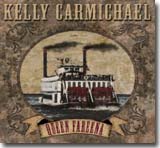 Multi-instrumentalist
and singer Kelly Carmichael took a circuitous
route to his chosen genre of interest, prewar blues.
Originally a hard rock guitarist in bands like
Internal Void and Pentagram with roots in Jethro
Tull, Black Sabbath, and Jimi Hendrix, Carmichael
turned to the blues full time in 2002, when he began
playing solo. He released a well-received disc in
2005, Old Stock.
Multi-instrumentalist
and singer Kelly Carmichael took a circuitous
route to his chosen genre of interest, prewar blues.
Originally a hard rock guitarist in bands like
Internal Void and Pentagram with roots in Jethro
Tull, Black Sabbath, and Jimi Hendrix, Carmichael
turned to the blues full time in 2002, when he began
playing solo. He released a well-received disc in
2005, Old Stock.
Queen Fareena,
Carmichael’s second release for Dogstreet Records,
is another entertaining offering of prewar stylings,
ranging from blues, ragtime, country, to Dixieland
jazz. Surrounded by an exceptional group of
musicians (Jean-Paul Gaster – drums, Johnny
“Lawless” Ray Carroll – upright bass, Scott Rich –
trumpet, John McVey – trombone, Alexander Mitchell –
fiddle, and Brian Simms – accordion), Carmichael
brings the house down with a sparkling set of covers
from the prewar era, along with a couple of original
compositions, the dazzling title track that fits
seamlessly with the classics, and “Booker Blues,”
which has a Dixieland feel with Carmichael’s banjo
and the backing trumpet and trombone. Carmichael is
a master on both guitar and banjo and his warm,
expressive vocals are ideal for the material.
Wisely, he doesn’t imitate the originals either
vocally or instrumentally, but performs them in his
own “voice.”
Among the well-chosen
set of covers are songs by Mississippi John Hurt
(“Richland Women Blues” and “Salty Dog”), and Robert
Johnson (a jaunty cover of “Last Fair Deal Goin’
Down”) that cover the Delta blues genre. Ragtime and
Piedmont styles are well-represented by covers of
Rev. Gary Davis (“She’s Funny That Way” and
“Cincinnati Flow Rag”) and Sylvester Weaver (a
swinging version of “Guitar Rag”), and the old
“hokum” blues style is featured on the humorous
“Terrible Operation Blues” and “Come On Boys Let’s
Do That Messin’ Around.” The final cut is a funky
cover of John Hammond’s “Untrue Blues.”
If you’re like me,
you’ll find yourself listening to Queen Fareena
over and over. It’s played with tons of energy and
enthusiasm and is just plain fun to listen to. It’s
great to hear old classics like these being redone
and modernized.
--- Graham Clarke
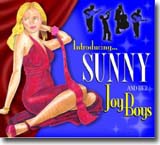 One of Duke Robillard’s
dream projects for the past 35 years has been to
record a tribute to the golden age of women
vocalists (the 1920s through the 1950s). In late
2007, Robillard heard singer Sunny Crownower
perform at a Harvard University concert, and
realized that he had found the voice to make his
project a reality. The end result is Introducing
Sunny and Her Joy Boys (Stony Plain), a stunning
mix of classic pop, swing, and blues songs of the
era.
One of Duke Robillard’s
dream projects for the past 35 years has been to
record a tribute to the golden age of women
vocalists (the 1920s through the 1950s). In late
2007, Robillard heard singer Sunny Crownower
perform at a Harvard University concert, and
realized that he had found the voice to make his
project a reality. The end result is Introducing
Sunny and Her Joy Boys (Stony Plain), a stunning
mix of classic pop, swing, and blues songs of the
era.
Robillard assembled a
stellar all-acoustic combo in support of Crownower,
including Paul Kolesnikow (acoustic archtop guitar),
Billy Novick (clarinet, alto saxophone), and Jessie
Williams (acoustic bass). Robillard also produced
the disc and he captures the feel of those old
classic records perfectly. You can almost hear
martinis being mixed in the background.
Crownower shines on a
beautiful set of songs, including the opener,
“Strictly From Dixie” (an early Ella Fitzgerald
hit), “That’s My Desire,” the gorgeous “You’re My
Thrill” (also available as a video on the disc), and
a trio of Duke Ellington masterpieces (“I Don’t
Mind,” “I’m Satisfied,” and “I Got It Bad (and That
Ain’t Good)”). Other standouts include “Today I Sing
The Blues,” “That’s My Desire,” and another Ella
Fitzgerald tune, “Undecided.”
Crownower’s irresistible
chemistry with the band, particularly with Novick
(on clarinet and saxophone) is first-rate. Robillard
does a fine job on guitar, as does the superlative
rhythm section of Kolesnikow and Williams.
Folks, they don’t make
them like this any more. Sunny and her Joy Boys are
a throwback to a long ago, much missed era of music.
Hopefully, we haven’t heard the last of them. Hats
off to Duke Robillard for making this dream come
true.
--- Graham Clarke
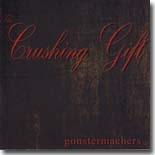 The gonstermachers
are not your typical blues band. The Syracuse-based
quartet employs instruments, such as ukulele, block
flute, gongs, cello, washtub bass, marxolin,
vocatron, washtub drum, camerounian tambour, zaphoon,
castanets, bongos, and war drum, to give them a
sound that actually goes beyond the ordinary
boundaries of the blues, stepping off into
categories like roots, Americana, and even rock and
soul. The Crushing Gift is a worthy follow-up
to their self-titled debut recording from 2007.
The gonstermachers
are not your typical blues band. The Syracuse-based
quartet employs instruments, such as ukulele, block
flute, gongs, cello, washtub bass, marxolin,
vocatron, washtub drum, camerounian tambour, zaphoon,
castanets, bongos, and war drum, to give them a
sound that actually goes beyond the ordinary
boundaries of the blues, stepping off into
categories like roots, Americana, and even rock and
soul. The Crushing Gift is a worthy follow-up
to their self-titled debut recording from 2007.
The opening cut,
“Charlemagne,” has a strong R&B feel, thanks in part
to guest gonstermacher Mark Ninni’s organ fills.
“All of Heaven’s Falling Rain” rocks between Leo
Crandall’s crunching guitar and gravelly vocals and
Curtis Waterman’s harmonica. “Effamira’s Tango” is a
standout track with its Latin rhythms and vivid
imagery, while “Bushmeat” is the most offbeat track
on the disc, a wild double entendre-laced tune with
amusing backing vocals and lots of special effects
mixed in.
Other highlights include
a fast and furious instrumental, “Baby Get Over It,”
which gives all four gonstermachers a chance to
shine. “And Your Devil Is Comin’” is a slow, spooky
blues initially featuring Crandall on guitar, before
Waterman jumps in with a mournful harmonica solo.
“John The Revelator” also gets an eerie reworking,
driven by Hymie Witthoft’s percussion and Waterman’s
harmonica. The final track, the title cut, features
Crandall on guitar.
Singer/guitarist/cellist
Crandall and harmonica player Waterman are out front
for the most part, but the driving force of the
gonstermachers’ attack is the powerful rhythm
section of Witthoft, who apparently plays every
percussion instrument known to man and Richard
Curry, who plays washtub bass.
A wide-ranging
collection of musical styles, The Crushing Gift
is a raw and emotional work, driven by excellent
musicianship and highly original songwriting.
--- Graham Clarke
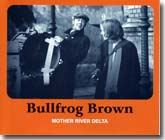 How about this for
something different? A blues band from Estonia, no
less. And they’re good!
They may be for Eastern Europe, but Bullfrog
Brown are rooted in Delta blues, and they know
what it’s all about too. They don’t just take old
standards and re-do them, they write their own songs
and perform them extremely well – their music has a
definite authentic Delta feel to it, made all the
better by the different accent of the singer’s
voice.
How about this for
something different? A blues band from Estonia, no
less. And they’re good!
They may be for Eastern Europe, but Bullfrog
Brown are rooted in Delta blues, and they know
what it’s all about too. They don’t just take old
standards and re-do them, they write their own songs
and perform them extremely well – their music has a
definite authentic Delta feel to it, made all the
better by the different accent of the singer’s
voice.
Six out of the seven
songs on Mother River Delta (Kwaq) are
written by Andres Roots, the remaining song is
written by Alar Kiisa – and there you have it, this
is a duo. Two guys who really enjoy their music, and
their music is blues. There’s no pretentious long
guitar solos, just lean and pure blues leaning on
the influences of early Muddy Waters, Mississippi
John Hurt, Bukka White.
Alar Kriisa handles the
vocals, and both guy play guitar with Andres Roots
taking on some percussion along the way and playing
some excellent slide guitar. You have a good look at
these guys, and find out a lot more about them by
looking at their web-site:
www.bullfrogbrown.com.
This CD opens with
“Nobody The Skull,” gravelly voiced vocals, slide
guitar, strange lyrics, gentle, relaxed, pure blues
– this stuff just makes you want more and more. Why
don’t some of today’s “blues artists” play this sort
of music instead of the wailing Stratocasters
banging out the same old five-minute solos?
Onto track two, “Special
Rider,” and the feel of early 1960s blues with
Andres Roots providing some percussion and Alar
Kriisa singing and playing guitar – all about a
special girl who can make a deaf and dumb man sing
and a caterpillar sting!
The next song, “30,” is,
for me, pure Mississippi John Hurt – all about a guy
reaching the age of 30, getting grey hairs in his
moustache and feeling old (they must age early in
Estonia!). This is a lovely contribution to the
blues, from two guys who are obviously dedicated to
the blues and who can write relevant songs and
provide the musical backing as well.
If you love pure,
unadulterated, delta blues, then please give these
guys a listen – you won’t be sorry!
--- Terry Clear
 Bernard Allison has,
apparently, likened Sweet Suzi to “a bluesy/soulful
mix of Etta James, Janis Joplin and Koko Taylor”,
and I can’t argue with that. Sweet Suzi & The
Blues Experience are from Long Island, New York,
and they certainly have that punchy New York sound,
whether they are rocking or grooving to a ballad.
Bernard Allison has,
apparently, likened Sweet Suzi to “a bluesy/soulful
mix of Etta James, Janis Joplin and Koko Taylor”,
and I can’t argue with that. Sweet Suzi & The
Blues Experience are from Long Island, New York,
and they certainly have that punchy New York sound,
whether they are rocking or grooving to a ballad.
Unbroken (Music
Avenue) opens with their version of Son Seals’ “Bad
Axe,” backed up by a horn section and with a hot
guitar break – heavy stuff, full of emotion, but
maybe a little too much for the opening track? I
would have put this track later in the album,
although I certainly wouldn’t have left it out!
Things slow down some with track two, the title
track “Unbroken”, and it’s now that you begin to
appreciate just how strong this woman’s voice it and
the breadth that it has – and also how well the band
support her. Track three, “Does Your Wife Know?,” is
a slow moody story of two cheating lovers, full of
atmosphere and very well-written, and again the
depth of Suzi’s vocals shines through.
There are some other
well-written tracks by various members of the band,
and some very good cover versions of songs that
don’t crop up very often on blues albums – like the
already mentioned “Bad Axe,” Denise LaSalle’s
“Slippin’ Out, Slippin’ In,” Robbie Robertson’s “The
Weight,” and two absolute classics, “I’d Rather Go
Blind” and “God Bless The Child.”
The Denise LaSalle
number is very well-executed, blusier than the
original, and really gutsy – with your eyes closed
and headphones on, this could be Janid Joplin
singing at times, the voice really is that strong.
Suzi’s version of “I’d Rather Go Blind” isn’t quite
Etta James, or Chicken Shack, but it’s oh so close,
and it’s good in its own right too.
But if you really want
to know about this woman’s vocal ability, then just
listen to track five, “Mama,” an incredible a
cappela song with just finger snapping to accompany
the voice. I’m not too sure how many modern singers
could carry this off in this sort of style, and this
track convinced me more than anything else that this
band are a bit special.
There’s a lot of
different styles and tempos here, and it’s the sort
of album where you hear something different every
time that you play it. This really deserves a
listen.
--- Terry Clear
 2010db (Music
Avenue) is the latest offering from blues-rocker
Rob Tognoni, the follow up to Ironyard
Revisited, and again it’s more rock than blues
unfortunately. I use the word unfortunately, because
this man can play the blues, and it would be great
to have a complete blues album from him. There is a
little blues mixed in with the rock, but more would
be better.
2010db (Music
Avenue) is the latest offering from blues-rocker
Rob Tognoni, the follow up to Ironyard
Revisited, and again it’s more rock than blues
unfortunately. I use the word unfortunately, because
this man can play the blues, and it would be great
to have a complete blues album from him. There is a
little blues mixed in with the rock, but more would
be better.
Recorded in Queensland,
Australia, the album opens with “This Is Rock n
Roll,” one of 11 songs on the CD written by Tognoni
– there are two covers, “Honeymoon Is Over” and the
old hippie anthem, “SanFrancisco.” This is a fairly
heavy up-tempo rocker, but track two, “Boogie Like
You Never Did,” slows things down and gives the
listener a small taste of the blues, mixed in with
the rock.
Track three, “Can’t See
The Smoke,” is bluesier still, a nice shuffle that
is slow and to the point – a whole CD of this style
of music would be great to listen to – definitely
one of the best tracks on the album for me.
“Another Tequila” is a
medium slow rock ballad, with some Bob Dylan type
influence, which actually contains some very nice
guitar work, and could easily have been given the
same treatment as the previous track. It shifts into
a beautiful instrumental, “Pouring Down On Me,” some
influence from Stevie Ray Vaughan and Jimi Hendrix
showing through – SRV’s “Riviera Paradise” springs
to mind here.
“TV Preacher” gives us
another taste of the blues, with some heavy rock
chords thrown in for good measure, and then it’s
back to rock with “Spaceman,” the title track
“2010db,” “The Broken String”, etc., through the
very strange version of “SanFrancisco” and ending up
with another dose of the blues “Honeymoon Is Over,”
with a hint of Tom Petty.
Technically, this is a
good CD, but it’s not for blues purists.
--- Terry Clear
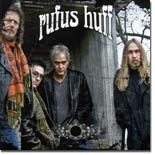 Rufus Huff (Blues
Boulevard) is the first offering from a Kentucky
band by the same name, Rufus Huff, comprised
of Dean Smith, Chris Hardesty, Jarrod England & Greg
Martin. The band first got together in 2005, and
this is their first album but it’s doubtful if it’s
their last.
Rufus Huff (Blues
Boulevard) is the first offering from a Kentucky
band by the same name, Rufus Huff, comprised
of Dean Smith, Chris Hardesty, Jarrod England & Greg
Martin. The band first got together in 2005, and
this is their first album but it’s doubtful if it’s
their last.
Leaning towards rocking
blues, the band quotes their influences as Cream, ZZ
Top, Jeff Beck, early Led Zeppelin, Mountain, Jimi
Hendrix and Cactus – get the picture? (I’d add Free
and Bad Company to that list). If you like your
blues heavy and rocking, then you’ll love the
mixture of tracks on this CD.
The CD opens with “I
Daze” with some heavy guitar riffs, courtesy of Greg
Martin and inspired, at least partially by ZZ Top &
Led Zep – all in all, a pretty good opening number.
The album notes don’t quote songwriters, but I’m
assuming all except two of the 12 tracks are written
by the band – the exceptions are Sonny Boy
Williamson’s “Good Morning Little Schoolgirl” and
Willie Dixon’s “Ain’t Superstitious.”
“Schoolgirl” is rocked
up very well, and although it’s the heaviest version
I’ve ever heard, it still perfectly retains the
flavour of the original – a little like Cream
did with “Crossroads” – it does get very heavy at
times, but I think Sonny Boy would approve! To My
ears, this is the best track on the CD, although
some of the others come very close.
“Superstitious” is, if
anything, slightly too heavy. It’s very reminiscent
of the early stuff that Free did, and the vocals
lean very much towards Paul Rodgers. However, that
doesn’t make it a bad track and fans of rocking
blues are going to like it a lot.
Make no mistake, this is
a whole album of heavy rocking blues – if that’s
what you like, then you’ll love this – it might even
convert a few rockers into listening to some more
blues to see where the influences are coming from.
--- Terry Clear
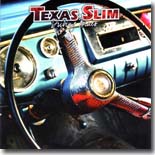 This is the first time
that I’ve heard of Texas Slim……I’ve got a
sneaking suspicion it won’t be the last!
How does Blues Boulevard Records get their hands on
this stuff? Driving Blues is very good blues,
with a little soul mixed in, and it makes me want to
see this band live.
This is the first time
that I’ve heard of Texas Slim……I’ve got a
sneaking suspicion it won’t be the last!
How does Blues Boulevard Records get their hands on
this stuff? Driving Blues is very good blues,
with a little soul mixed in, and it makes me want to
see this band live.
The band, hailing from
Dallas, Texas, previously brought out a CD in 2002,
I Have Arrived, but unfortunately it slipped
past me – I’m so impressed with this latest album
that I’m determined to get my hands on the earlier
one!
The band includes Aaron
Comess (from the Spin Doctors) on drums, bass and
percussion, and the album was recorded at his studio
in New York State – guests on various tracks on the
CD are Andy Comess on pianos, Pat Daughery on
electric piano & Todd Horton on trumpet.
The album opens with
“Welcome To The Game,” an up-tempo rocking blues
showcasing some good Texas Slim guitar –
incidentally, he also plays organ and dobro on the
album and takes care of the vocals too. All of the
tracks on the album are composed by Texas Slim, but
you’ll find that track two, “Driving Blues” is very
heavily influenced by “Roadhouse Blues,” the old
Doors track. That’s a minor criticism, because the
track is very clearly the band’s own and it will
have you tapping your feet along with the rhythm.
The tempo slows down for
tracks 4 and 5 – “You’re Hip” & “Funky Love” picks
up a little for “De Ville” and then slows down for
track seven, “When It’s Cold Outside” – this is my
absolute favourite on the album and features Slim on
slide playing good country blues – a slight taste of
Little Feat on this one. I wish he’d added some more
slide to the album, because the flavour it gives the
music is superb.
From there the tempo
fluctuates up and down, without a bad track – if you
like tinkling ivories, then track 12, “And It Is,”
is the one for you. This track is moody,
atmospheric, slow blues – excellent!!
--- Terry Clear
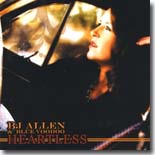 It’s no secret that the
Blues stays alive and continues to grow, because
everywhere in America’s heartland there’s a local
band within the community who is committed to
ensuring that the Blues is still appreciated, that
it’s still heard. Such is the case with Kirksville,
Missouri’s band, BJ Allen and Blue Voodoo. This
little band that can still continues to self-produce
great records, and Heartless is no exception.
It’s no secret that the
Blues stays alive and continues to grow, because
everywhere in America’s heartland there’s a local
band within the community who is committed to
ensuring that the Blues is still appreciated, that
it’s still heard. Such is the case with Kirksville,
Missouri’s band, BJ Allen and Blue Voodoo. This
little band that can still continues to self-produce
great records, and Heartless is no exception.
“Don’t Know What You’re Missin” is our first cut up
and it’s all about the fact that Blues is the music
we all should be listening to. Jerry Fuller’s guitar
seems like an old friend to me as BJ lets us know
that we should all be out hearing some Blues. “Come
on and let the music move you…up and out of your
seat…you just might find…if you move your behind…the
power of the Blues can’t be beat!!” Truer words were
never spoken.
I’d forgotten that JP Hurd also plays
harmonica ,and I’m pleasantly reminded of that fact
on “Radio Song.” It seems no matter which way BJ
Allen turns the dial on her radio, she just can’t
find anything of value to listen to. Her best
alternative? Get everybody up and just start playing
some blues. “I finally said, “Jerry, pick up that
old guitar…play us something that we can use!”
Jerry’s guitar solo reaffirms BJ’s contention that
the Blues is what she needed to hear and Jerry’s
more than happy to oblige her. Our next tune,
“Borderline”, refers to the Mason-Dixon Line and a
juke that serves up some nasty blues. “Come on
down…you’ll be feeling mighty fine…just a short
drive south of the Mason-Dixon Line…we’re going to
party all…night…down at the Borderline!”
The first slow ballad of the record is our title
tune, “Heartless.” Seems BJ’s lost her heart and
just can’t find it anywhere. “You see…I gave my love
to a heartless man…won’t you help me find it…if you
can…will you please tell me how…I fell for such a
scam.” Love’s lessons are sometimes harsh and BJ’s
definitely learned her lesson here. “Take Out Some
Insurance” is BJ’s way of telling the man in her
life that he’d better, never leave. “Take out some
insurance on me baby…cause if you ever…ever say
goodbye…I’m gonna lay right down here and die!”
That’s a heavy responsibility to take on; he’d
better call the insurance agent right away!
Guitarist Jerry Fuller writes the majority of tunes
for the band and our next cut, “Do Something,” is an
excellent view of the world today. “Got to be a
little smarter…think beyond today…think about the
little ones…and the price they’re going to pay…I’m
just an average Joe…but if I had my say…I’d say
please, we ought to be doing something!” We’re
definitely living in different times these days and
Jerry’s right, we all have the capability to be
doing something that can help. “We ought to be doing
something!!”
I never get tired of BJ Allen singing a ballad and
she serves up a beautiful rendition of our next
tune, “Sunday Kind of Love.” “My arms…they need
someone to enfold…to keep me warm…when Mondays and
Tuesdays grow cold…a love for all my life…that I can
have…I can hold…I need a Sunday kind of love!” I
don’t know of anyone alive who wouldn’t appreciate a
Sunday kind of love.” Bassist JP Hurd wrote the next
tune, “It’s All About You,” and it seems BJ’s found
herself a player that she’s not quite sure what to
do about. “You got me jumping and a stompin’…pacing
the floor…ringing your phone…and pounding on your
door…my mind is all over you…vision’s burning into
my head…I guess its all about you…and the crazy
things you said!” He’s definitely woven a spell over
this girl, “Now I’m drowning in my blues…drowning in
my Johnny Walker Red!” Sad to say, it ended badly.
Our next cut, “Tryin’ to Find the Groove,” is all
about making sense in a crazy world. “Your head is
in the clouds…while your feet touch the ground…don’t
get confused…come on...get up…put on your shoes…baby
your just trying to find the groove!” You just have
to get up, take two steps forward and one step back
but you’ll find your way. “Iron City” is another
tune written by JP and it focuses on BJ’s need to
get out…to move on. “Got to break away from the old
rust belt…go to reclaim my soul…can’t you people
hear what I’m talking about…its time for me to take
control…how long…how long must I stay…got to get
up…out of this place…this old iron city!”
Our final
cut on Heartless is another ballad, “Get It While
You Can.” Jerry displays his keyboard talents on the
intro as BJ admonishes us to reach for life and
love. “So if someone should come along…and try to
give you a little love &and affection…I say…get it
while you can…baby, get it while you can…don’t you
turn your back on love!” Truer words have never been
sung.
I’m glad to have had the opportunity to get to know
and appreciate BJ and her band. This is their third
project that I’ve reviewed and all three releases
are indicative of what a wonderfully tight and
talented band this group from the heartlands of
Missouri really is. If you’re ever near Kirksville,
go check them out. They work as hard at their craft
as any nationally touring act you’ll ever have the
pleasure to see. In the meantime, you can pick up a
copy of Heartless from the band on their website,
www.bluevoodooblues.com. I’d also like to send a
personal shout out to David, “I hope you’re feeling
better my friend and are back up behind the kit
soon!”
--- Kyle Deibler
 I always appreciate it
when an artist contacts me directly in support of
their project. I’m impressed by the initiative and
it’s a way to discern just how committed he/she is
to their craft. Such is the case with Philadelphia’s
Deb Callahan. I’ve read numerous festival
reviews over the past few years mentioning her
band’s performance, but it wasn’t until Deb sent me
a copy of her latest release, Grace & Grit,
that I had a chance to hear her music for myself.
The grit comes from Deb herself, her determination
to succeed as a blues woman and her attention to all
the details that impact her success. The grace comes
from her vocal delivery and the polish found in the
songs she’s written. It’s a winning combination, so
let’s have a go at Grace & Grit.
I always appreciate it
when an artist contacts me directly in support of
their project. I’m impressed by the initiative and
it’s a way to discern just how committed he/she is
to their craft. Such is the case with Philadelphia’s
Deb Callahan. I’ve read numerous festival
reviews over the past few years mentioning her
band’s performance, but it wasn’t until Deb sent me
a copy of her latest release, Grace & Grit,
that I had a chance to hear her music for myself.
The grit comes from Deb herself, her determination
to succeed as a blues woman and her attention to all
the details that impact her success. The grace comes
from her vocal delivery and the polish found in the
songs she’s written. It’s a winning combination, so
let’s have a go at Grace & Grit.
Strong guitar fretwork
from Allen James sets the tone for Deb’s first cut,
“Food on the Table.” Her man’s left her to fend for
herself and she’s got two kids to feed. So Deb does
what she has to do to keep her family fed. “So I got
me a job…making minimum wage…then I rush to the
gentlemen’s clubs…so I can really make some pay…go
ahead and judge me….tell me I’m no good…but you
don’t know what you might do…when a hungry child’s
crying out for food.”
“Get It Right” finds Deb
reflecting on relationships that have gone bad and
what she needs to do differently to make one work.
“Don’t cry about things that could have been…this
time…going to get it right!” Up next is an excerpt
from a tune by Nina Simone, “I Wish I Knew How It
Would Feel to Be Free.” Throughout her record Deb
sings three other excerpts to honor other influences
in her life: Ray Charles, Joni Mitchell and Aretha
Franklin. It’s a nice touch that I’ve not seen an
artist do before.
Deb’s self-examination
continues in “How Many Times,” reflecting on the man
in her life that continues to move in and out
without really committing to the love she’s looking
for. “How many times…would I let you wipe my tears
away…tell me things are going to change…how many
times…will I give you another chance….before I turn
my back and walk away.” Deb knows she gives her
heart too easily and she needs to set the boundaries
that will ensure she’s in a healthy relationship.
Tempo and the keyboard
work of Glenn Bickel provide the framework for Deb’s
analysis of her current relationship in “Obstacle to
Love.” At times, opposites do attract but this time
there might just be too many differences to make it
work. “Love is not easy…its hard to withstand…all of
the differences…and all of the demands…when two
worlds collide…you’ve got to compromise…its going to
take some work…to keep this romance alive!” Here’s
hoping it all works out for Deb. “Guilty” finds Deb
admitting she’s at fault. “I’m guilty…everything…you
accuse me of…I don’t need no judge…no jury…to know
I’ve wronged the one I love.” A moment’s
indiscretion cost Deb the affections of the man who
really loved her. It’s a hard lesson to learn and
it’s even more painful for her to admit that she’s
really not the good woman her lover thought she was.
Moving on to “Carry Me,”
here we find Deb trying to escape an argument
between her mother and father. Her solution is to
sneak out the window and head to the river. “My
body’s floating peacefully…downstream…only the river
knows my secrets…gonna let it carry me!” The cold,
cool waters of the river offer the only comfort that
Deb knows. “Insomnia Blues” finds Deb with too many
thoughts running through her mind, keeping her
awake. “I can’t sleep a wink…can’t sleep a wink at
all…you know…I can’t sleep a wink…I understand
now…why some people drink.” Deb is choosing to
tackle everything head on, eschewing the sleeping
pills offered up by her doctor and a million other
remedies that promise to help her sleep.
A tune by Ray Charles,
“Hallelujah I Love Him So,” is the only non-original
track on the record and pays homage to Ray’s
influences on Deb’s music. “That’s why I know…Lord,
I now…hallelujah…I love him so.”
“Happy Hour Girl” is a
testament to those barflies found in every club.
“Willie’s eyes are steel blue…his skin…tanned
leather…she’s got his arm on his shoulder…he has his
hand on her thigh….they call her…happy hour girl…oh,
yeah…she’s trying to get happy tonight!” Deb’s phone
keeps ringing in “No Taxi Driver,” as everyone
mistakenly calls her number to come get them. “I
ain’t trying to be your taxi driver…I ain’t trying
to be your chauffeur no way…can’t you
understand…you’ve got the wrong number…no one gets a
free ride with me!” Deb lets us know that she’s in
search of a real love in the ballad, “Big Wide
Space.” “There’s a big wide space…that I feel in my
heart…oh, it’s for you baby…always for you…heart
aches…for you!”
Grit & Grace
closes with what is probably Deb’s mantra, “Work a
Little Harder.” “I’m going to keep on moving….never
be a quitter…I’m going to work a little harder…oh,
I’m going to get a little smarter…going to work a
little harder…make it all happen anyway!” More power
to her for her attitude alone!
I’ve enjoyed Deb’s disc.
The purist in me wishes that somehow I would have
felt more connected to the emotions that surely
exist behind the songs. There’s a restrained feeling
to it all that lingers for me, that tells me that
for whatever reason Deb held a little bit back.
Hopefully, on the next disc she’ll air it all out
and then we’ll really know this woman’s joy and
pain. After all, this is the blues and it only works
if it touches our souls. You can order Deb’s disc
and find out more about her at
www.debcallahanband.com.
--- Kyle Deibler
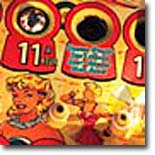 Part of the mission
statement of Vista Records more than accurately
describes Deanna Bogart’s new release on its
label; the goal is “to capture the sounds of great
artists who play the blues, jazz, and the fusion
between them.” 11th Hour is exactly that, a
recording of a great artist who plays blues, jazz
and the fusion between the two. The Blues man in me
wishes for more blues on this record, the Deanna
Bogart fan in me appreciates the mix. Either way,
I’m still waiting on the crab legs, so let’s get on
to the record.
Part of the mission
statement of Vista Records more than accurately
describes Deanna Bogart’s new release on its
label; the goal is “to capture the sounds of great
artists who play the blues, jazz, and the fusion
between them.” 11th Hour is exactly that, a
recording of a great artist who plays blues, jazz
and the fusion between the two. The Blues man in me
wishes for more blues on this record, the Deanna
Bogart fan in me appreciates the mix. Either way,
I’m still waiting on the crab legs, so let’s get on
to the record.
Keith Crossan’s sax and
Tom Poole’s trumpet form the horn section for our
first cut, “Sweet Pea.” Sweet Pea is a young girl
who followed her heart and it led her to the music.
“From somewhere inside her…a shooting star…so she
let it guide her…right through a blue guitar…and
there you are…oh sweet pea…where have you gone?”
Hopefully Sweet Pea is out there somewhere, still
listening to the music that started her on her
journey.
“High Horse” tackles a
different subject entirely, the rudeness of fellow
artists sharing a bill. A show with multiple acts is
tough enough to coordinate without the cooperation
of your fellow artists, and evidently Deanna’s had
enough. “Get off of your high horse…yes, its just
like it sounds…get off of your high horse…the way I
see things…you’re out of bounds!” Hmm, wonder whose
high horse we’re talking about this time. The
stories that could be told. Nuff said on this topic.
Next up is a wonderful duet with Tommy Castro, “Love
and Attention.” Rare is the love that draws both
partners in equally, this is one relationship that
works. “All that I want to do…is just to be with
you…and give you all of my love and attention!” A
rather passionate sax solo by Deanna lets us know
she’s all business this time.
“Cause We’ve Ended as
Lovers” explores the possibility of maintaining a
friendship after the relationship has ended. “Cause
we’ve ended now as lovers…does our love for one
another have to end?” An impassioned extended
instrumental by the band portrays the difficulty
involved in maintaining such a friendship. While not
impossible, more often than not it just won’t work.
“Heart and Soul” finds Deanna comfortably ensconced
in a relationship that is working for her, one she
is committed to. “Still I’m in it, (heart and soul),
yes I am (heart and soul), for the good times (heart
and soul), the good times and the bad…with my mind
in control…I am in it…heart and soul!”
Next up is “Almonjoi,”
an instrumental meant to serve as an intermission on
the record. This is where you hear Deanna’s band at
its best; they all have strong jazz, as well as
blues, influences and left to their own devices they
can air it out quite well. Realistically, I think
Deanna needed a chocolate fix but that’s just
conjecture on my part.
John Hiatt’s “Have a
Little Faith” is one of my favorite songs and it’s a
song that I’m pleased to hear Deanna sing. It’s
beautifully done and a real treat on 11th Hour.
Next up is “Avery’s Town,” celebrating the birth of
a son to a widow who’d lost her husband in the war.
“Since he was small they knew him all and what he
aimed to do, be like the man he loved but never
knew!” Moving on to “Unkl funkl,” the sweet bass
notes of Scott Ambush make their way front and
center as the band tackles another instrumental.
There’s definitely enough funk in this version to
satisfy everyone. Our next cut, “Thrash Boogie
2010,” starts off with Deanna’s piano before
everyone else joins in at breakneck speed. Frenetic
only begins to describe the musical velocity of
“Thrash Boogie 2010.”
11th Hour closes
out with the title track, “Eleventh Hour Blues,” the
one original ballad on the record. Here Deanna has
been given the choice of whether or not her
relationship is coming to an end, and she chooses to
end the relationship. “You left it up to me to
choose…and I went and I let you go…you went and
laced up your walking shoes…and I let my chance at
love slip by.” In the end, Deanna reconsiders and
heads out to try and find the lover she let walk
away. I think we can safely assume she caught up
with him, somehow, someway.
11th Hour takes
me to a different place than where I’m use to going
with Deanna’s music. There’s a lot less structure
than I’ve heard in the past, but the lack of
structure is also artistically freeing. Deanna and
her band go where they want to, when they want to,
and the results lead to some very interesting
instrumental tracks to go along with Deanna’s
original tunes and some time-tested covers. I know
I’ll get a chance to catch up with Deanna and her
band the end of May, and I’m looking forward to
seeing how the tracks from 11th Hour settle
into a new set list. It will definitely be fun. Grab
a copy of this disc from Deanna at her website,
www.deannabogart.com. She’ll be happy to sign it
for you.
--- Kyle Deibler
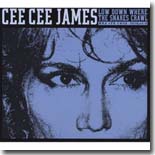 I’d heard rumblings
about Cee Cee James coming out of the
Northwest for awhile now and decided to see for
myself what this Blues woman was all about. After
all, with a record title of Low Down Where the
Snakes Crawl, there had to be some substance
behind the woman who wrote it. What I’ve found is
one of the first really interesting listening
sessions that I’ve had in quite awhile. So let’s
delve into it.
I’d heard rumblings
about Cee Cee James coming out of the
Northwest for awhile now and decided to see for
myself what this Blues woman was all about. After
all, with a record title of Low Down Where the
Snakes Crawl, there had to be some substance
behind the woman who wrote it. What I’ve found is
one of the first really interesting listening
sessions that I’ve had in quite awhile. So let’s
delve into it.
Up first, of course, is
the title track, “Low Down Where the Snakes Crawl.”
Intricate guitar picking by James Howard sets the
appropriate sense of desperation as Cee Cee works to
convey the pain that is in her soul. “I couldn’t see
no reason…Lord, to continue on…where down where the
snakes crawl…why did you walk away honey…leaving me
with no love?” Lost, alone, in complete despair, Cee
Cee is asking God just how much more pain can she
bear. The end of this relationship tore her open to
her very core and moving forward from here does not
seem possible.
The presence of evil
continues to haunt Cee Cee with the presence of
“Black Raven.” “Black raven calls out my name…black
raven screaming out my name…what you do with your
days now girl…what you doing…wasting time?” "Black
Raven" is causing Cee Cee to question her existence,
to find a purpose, to end this sense of despair that
is following her around. Our next tune, “Love Makes
Change,” finds Cee Cee a bit more optimistic. “Love
makes change…love makes change…give it a buck…and
you get back two…but you got to go…you got to go…to
where it takes you!” Experience has taught her to
follow her muse, wherever it leads her.
Tribal drumming and
rattles provide the introduction to “Desert Blues.”
Cee Cee’s on a journey that takes her to the desert,
back to her roots, to examine her life’s path. “…way
out in no man’s land…where I called out to you…help
me change my ways…teach me how to be true.” Lessons
learned in the desert work to carry her further on
her way. The tribal drums give way to slide guitar
as we move on to “Roll Me Over.” “Oh my, the twist
and turn…oh my, the lessons learned…oh oh…the things
I’ve done…oh, oh…the innocence burned.” Cee Cee’s
journey has not been an easy one and she perseveres
in her quest for love and the truth.
More slide guitar from
Rob Andrews sets the tone for “Make It to the Other
Side.” Here a river provides the metaphor for moving
forward, it’s important that Cee Cee make it to the
other side and lives. “Some rivers run shallow…some
rivers run deep…some kind of magic mojo…is going to
make me strong…I’m going to paddle…all night
long…I’m going to make it…make it to the other
side!”
“I’ll Ask the Questions,
You Tell the Lies” provides an interesting interlude
on a record so far that has created a sense of
desperation, a quest for understanding of life. The
classic tale of a man who cheats on Cee Cee and she
knows it, at this point she’s heard it all. “I’d
rather leave…rip you a new back end…cause that’s the
payback baby…for this cheating game…its come that
time for you…to kiss my sweet behind goodbye!”
“White Picket Fence”
becomes the metaphor for an honest, true man in our
next track on the record. “There’s one kind of
woman…who keeps that fence clean…who keeps that lawn
green…oh, honey…ain’t life grand…oh baby, all you
wish you ever had”! “Watermelon Lucy” is the tale of
a woman who lost her husband in Vietnam, her kids
are grown and life alone has distorted her sense of
the world. “They call her Watermelon Lucy…cause her
mind’s gone a little bit goofy…all the watermelon’s
juicy…half the long gone Lucy.”
It’s confession time for
Cee Cee on “Done Love Wrong.” In this case, she
didn’t really understand what a good man she had. “I
played your heart…I played mine, too…played…such a
lame excuse for lust…with such big time losing…I
done love wrong.” Understanding the error of her
ways won’t replace the love of the good man she’s
lost. Hopefully it’s a good lesson learned.
“Spirit of the Shaman”
closes out what has been a very interesting disc.
The spirit of the Shaman makes itself manifest to
Cee Cee is so many ways…from the love of a good
man…to the presence of friends who care about her…to
others sent to help her find her way. “I can find
him in the wind…in the sun, the moon, the stars…in
my husband, in my friends…in the neighbors,
relatives…comes disguised…to teach me good…he comes
disguised to teach me love…a strong love…to set me
free!”
Low Down Where the
Snakes Crawl has been one of the more
interesting records I’ve had a chance to listen to
so far this year. Cee Cee James writes songs from a
place of emotional honesty that few artists care to
reveal. The result is an intimate, sometimes
guttural view of a woman who isn’t afraid to face
her demons and work out her life’s lessons. From
that perspective, “I’ll Ask the Questions" and
Watermelon Lucy” seem oddly out of place to me.
Perhaps one of these days I’ll cross paths with Cee
Cee and she can explain those tunes to me.
But this is definitely
an excellent record from a female artist who isn’t
afraid to bear her soul. I applaud her for that. And
I encourage you to look her up, you can find out
more about Cee Cee on her website at
www.ceeceejames.com.
--- Kyle Deibler
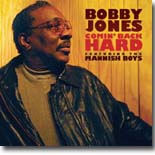 I had the opportunity to
see Bobby Jones for the first time last
August at the Heritage Music Festival with the
Mannish Boys. Bobby was on fire that night and I’m
sure everyone in the audience appreciated his secret
move for keeping a woman satisfied. It’s truly
indescribable. But I was unaware of the fates that
intervened on Bobby’s behalf to enable him to become
a member of the Mannish Boys, and ultimately led to
the release of his own record on the Delta Groove
label, Comin’ Back Hard. I’ll leave the liner
notes for you to read, the disc is spinning in my CD
player now.
I had the opportunity to
see Bobby Jones for the first time last
August at the Heritage Music Festival with the
Mannish Boys. Bobby was on fire that night and I’m
sure everyone in the audience appreciated his secret
move for keeping a woman satisfied. It’s truly
indescribable. But I was unaware of the fates that
intervened on Bobby’s behalf to enable him to become
a member of the Mannish Boys, and ultimately led to
the release of his own record on the Delta Groove
label, Comin’ Back Hard. I’ll leave the liner
notes for you to read, the disc is spinning in my CD
player now.
Bobby starts off with
“She’s the One.” This is the woman that Bobby loves
and he’s on his best behavior to keep her in his
life. “She’s the one…that makes me feel good…and
I’ll always do…the things I should!” Bobby has the
full force of the Delta Groove armada behind him,
and Kirk Fletcher’s guitar solo is setting the
standard for what is a great listen.
Next up is Willie
Dixon’s “Two Headed Woman.” “You got a two-headed
woman…knows everything you do…keeps two eyes on
me…two more eyes on you!” Distinctive notes from the
guitar of Paris Slim keep this song moving right
along and Bobby in line. Always the lover, Bobby’s
met his match in “I Must Be Crazy”. “Please have
mercy…won’t someone have mercy on me…the woman do
wrong things before my eyes…just how crazy can I
be?” Randy Chortkoff’s distinctive harp notes
accentuate the fact that Bobby is crazy; this is one
woman he should walk away from.
More harp phrasing from
Randy marks the intro of our next tune, “Come In Out
of the Rain.” Always the smooth talker, Bobby’s
working on the next object of his affection. “Don’t
you know baby…it’s thundering and lightening too…you
ain’t got no sense girl….honey, what’s wrong with
you…come in out of the rain!” You can be sure it’s
safe and warm inside Bobby’s house. The upright bass
of Ronnie James Weber lends a consistent back beat
to our next tune, Ike Turner’s “Get It Over Baby.”
Bobby’s in love with a woman who isn’t returning his
affection anymore. “I know you don’t love me no
more…cause you’re not the kind to tell me so…get it
over baby…stop leading me on!” The twinkling ivories
of Fred Kaplan play in the background as Bobby
struggles to figure out the mess that is his life in
“I Don’t Know.” Mournful notes from Al Blake’s harp
are indicative of the pain that Bobby is feeling. “I
don’t know…who is loving my baby tonight…but its one
thing I know for sure…she sure aint’ treating me
right”. Let her go Bobby, let her go.
Kid Ramos steps to the
forefront with a guitar solo as Bobby lets his woman
know, “I’m Tired of Your Jive.” “You think I don’t
see…what you do behind my back…you think I ought to
love you baby…no matter how you act…I’m telling you
mama…you’re going to miss me when I’m gone…I’m tired
of your jive!” Bobby continues to feel the pain of a
relationship gone bad in “Cry For Me Baby.” “Now
where you last night…I cried all night long…only way
you do me baby…is wrong, wrong, wrong…cause these
tears, tears, tears…why won’t they let me be…I wish
just once…you would cry for me!” It’s not happening
Bobby, move away from this one.
Bobby’s found himself
another bad woman to love in “Three Handed Woman.”
“She’s a three handed woman…and she ain’t no good
for you…now she’s right handed, left handed…and
under handed too!” A two handed woman is enough for
me; Bobby had better keep looking for a good woman
to love.
Finis Tasby joins Bobby
on the microphone to sing a stirring rendition of
“Mystery Train,” a concert staple of the Mannish
Boys, and the Ike Turner classic “How Long Will It
Last” rounds out what has been a very enjoyable disc
to listen to.
Serendipity brought
Bobby Jones to Delta Groove and we’re better off
because of it. Bobby has been largely un-recorded
his entire career and his first disc for Delta
Groove, Comin’ Back Hard, fills that void
admirably. There’s no doubt that Bobby has a few
more classics left in him and I’m sure that Randy
Chortkoff will make sure to get him back in the
studio soon. In the meantime, enjoy Comin’ Back
Hard for what it is; a great return to action by
one of our genre’s few remaining classic soul
singers. Grab a copy of Bobby’s disc on the Delta
Groove website,
www.deltagroovemusic.com. You’ll find that a
little Bobby Jones in your CD player is good for
your soul!
--- Kyle Deibler
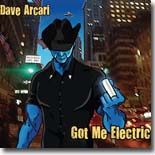 Wow, where do I begin? I
saw Dave Arcari in concert and became an
instant fan. I have never before seen a National
guitar played quite like this .. Dave thrashes the
strings to within an inch of their lives, and the
beer-soaked growl of his vocals would frighten a
police horse .. this is blues from the Clyde Delta,
bare-knuckle blues with a harder, more dangerous
edge, that would bring joy to the old bluesmen of
Maxwell Street.
Wow, where do I begin? I
saw Dave Arcari in concert and became an
instant fan. I have never before seen a National
guitar played quite like this .. Dave thrashes the
strings to within an inch of their lives, and the
beer-soaked growl of his vocals would frighten a
police horse .. this is blues from the Clyde Delta,
bare-knuckle blues with a harder, more dangerous
edge, that would bring joy to the old bluesmen of
Maxwell Street.
Of the 13 tracks on
Got Me Electric (Buzz Records), nine are penned
by Dave Arcari, and his writing takes the listener
through a variety of emotions as his music lifts you
off your feet and smashes you against the wall.
The title track, "Got Me
Electric," is a brilliant concept whereby Dave
begins acoustically before plugging in his National
for an electrifying treat that you've simply got to
hear. "Close To The Edge" takes you to a sweaty
beery blues club (or even a boozy Irish bar) where
you can imagine everyone joining in the chorus.
Blind Willie Johnson's
"Soul Of A Man" gets a sublime treatment, and if you
think you think you know all about Robert Johnson's
"Walking Blues," you need to hear Dave's version.
Dave's blues are not for
the fainthearted, but if you "get" him, you will be
rewarded with a permanent smile that cannot be
scrubbed off with a wire brush. Buy this CD and your
soul will thank you.
--- Gordon Morris